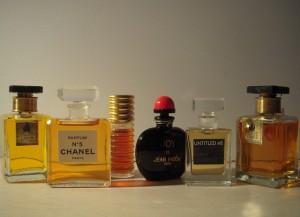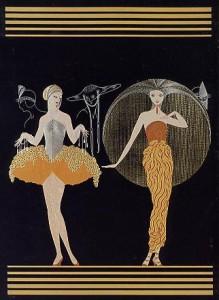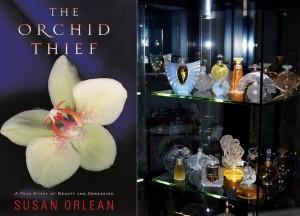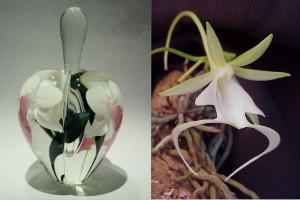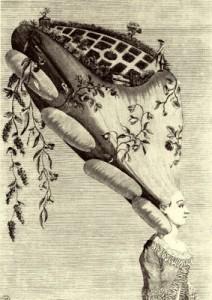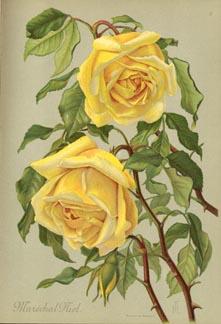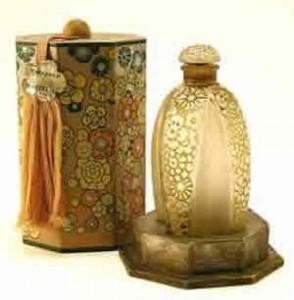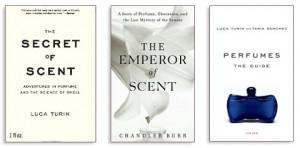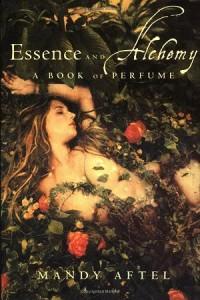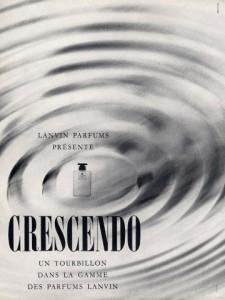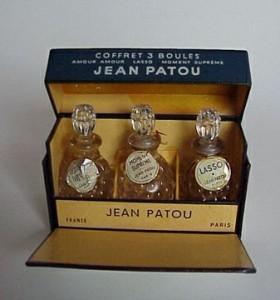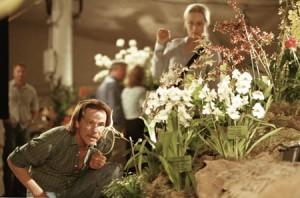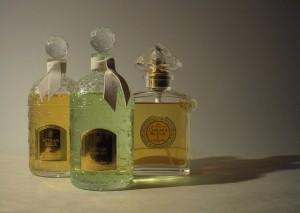In every area of human endeavor there lurks the possibility of going over the top, so to speak. It takes passion, commitment and hard work to accomplish anything important, and so of course we value these traits in ourselves and others. This can apply to our working lives and our personal avocations alike. But at what point do drive and passion become obsessive enough to take over everything else in our lives? How do we find balance while pursuing that which we love to distraction? Do we want to walk the fine line or are we better off giving in to our enthusiasm and wallowing in joyful excess?
Courtesy: Tama Blough
For those of us who love perfume, we can justify our “hobby” as long as it does not steal from other parts of our lives; we still have to pay the electric bill and buy food, but we are willing to give up certain discretionary items and luxuries in order to acquire a bottle of something precious that we have been longing for. The big question is this: once we do have that prize in our possession, why and when is it not enough? Why do we still want more, and proceed to set our sights on the next acquisition, whether it is the newest release or a rare vintage?
The single-minded determination to acquire things is something that everyone can relate to on some level. There are collectors of almost everything imaginable, from matchbooks to war memorabilia. Some of these objects of desire are very unusual and may even seem strange to others, while others are popular and enjoyed by many. For those who can afford it, and they are very few in number, a collection of vintage Fortuny gowns is actually attainable, and while the rest of us may gasp in envy and awe, we know exactly why this person has gone to the trouble of obtaining them; it is because they are beautiful in a universally understood way.
To me this is what ties the passion for perfume together with that of those who love fashion, art or rare plants. The love of beauty is a powerful thing, and trying to capture it has driven people to do extraordinary things. Sometimes it has nothing to do with their monetary value; we all love the ideal of beauty, especially when that is combined with actual or perceived rarity. If you have ever read Susan Orlean’s wonderful book The Orchid Thief you will have had a window into the mind of someone who was utterly consumed by his obsession with finding an extremely rare and endangered flower, to the detriment of almost all other things in his life. It is a true story, but after reading it one might think that the central figure in the saga, John Laroche, had to be an invention of the author.
Flacon and Ghost Orchid
However, there is another book out there called Orchid Fever, which is about the worldwide phenomenon of plant enthusiasts in pursuit of these fascinating flowers, and Mr. Laroche would fit right in with these people. Their dedication to these plants is both awe-inspiring and a bit scary. However, when one gazes upon one of these exotic flowers, it’s easy to understand the attraction. The object of such intense devotion in The Orchid Thief is the hauntingly strange yet ethereally lovely Ghost Orchid.
I can understand something of this mindset, because I am a plant lover and a gardener, and although I have not traveled to all corners of the globe to seek what I crave, I have felt the pull of wanting one of every kind of some plant, whether it is irises, dahlias, chrysanthemums or my favorite of all, lilies. I can never have enough! Amateur and professional hybridizers all over the world work for years to produce the next big commercial success or unusually exotic form. Who could not want more of these luscious beauties?
Maréchal Niel’
To me they are every bit as beautiful as orchids, and their fragrance is a perfect match for their seductive appearance. I am also a rose lover and I too long for that which I cannot have. I live in a mild winter area where almost any kind of rose grows like a weed with little or no protection against the cold. So which rose am I obsessed with? A fragrant yellow antique climber in the Noisette group called ‘Maréchal Niel’, said to be scented of wild strawberries, which is too tender to survive where I live without the benefit of a greenhouse. Of all the roses I could grow, I have to covet that one!
Which brings me to perfume collectors – there are two kinds of desire in play here; that of the perfume itself and of course the many wonderful bottles. Which comes first, the fragrance or its vessel? For me a really great bottle gives a clue as to the nature of the perfume inside. The most beautiful ones are works of art in themselves, and many people only care about that, but true perfumistas are different.
Renee Lalique Tout Les fleurs Gabilla
We may admire a gorgeous Lalique crystal creation, but what really counts is the “jus.” If the bottle held dish soap or motor oil it would not seem so enticing. We crave the whole experience, from the inception of longing for a particular rare perfume to the excitement of finding it, the anticipation of waiting for its arrival, and finally the moment of discovery when the promise of pleasure held out by the exterior appearance is fulfilled at last when we open it and breathe in the precious elixir we have so long desired.
But then, for the truly obsessive collector, the high soon fades away and the chase begins again. Will it be something everyone else wants too, like a flacon of vintage Guerlain Djedi? This can be had, rarely, albeit for a very high price. Or do they covet something so obscure and forgotten that it requires years of sleuthing and research? If it’s the latter, the perfume lover’s mania can easily approach the level of an orchid fanatic. The telephone and the Internet has enabled (and I use that word deliberately) people to find things they never even knew they wanted, let alone feed existing appetites. Who among us has not stumbled across something highly desirable by sheer chance and wondered how we ever lived without it?
Luca Turin -Fragrance Critic
We live in a time when almost anything we could ever want can be had with far less effort than at any time in history, as long as we are willing to pay for it. It’s easy to tip over the edge from wishful thinking and into real temptation and then to total loss of control. We connect with fellow fans of perfume on social networking sites like Facebook and find people to do our shopping for us in other countries at stores that don’t ship to wherever we happen to live, and these “scent mules” carry the treasures back home like the world’s most delicious contraband. We read blogs like this one and search for reviews of a new perfume we want to buy, trying to find a consensus among those who have already tried it: Is it any good? What did “X” reviewer think of it? Is it worth the money? And when we do take the plunge, we wait impatiently for its arrival, with a box cutter stashed in the glove box of the car so we don’t have to wait until we get home from the post office to open it.
Banded Civet: Its not a Cat!!!
It was only when improved methods for both growing tropical plants in greenhouses and propagating them in large numbers was developed did the carnage stop. As far as perfume goes, many of the plant materials used in perfumery have been cultivated for hundreds of years, but until relatively recently wild animals were either killed or captured for their essences; beavers, civet mammal, musk deer and other creatures were all hunted down, and some of them almost to extinction. A brisk trade in rare woods for the manufacture of perfume was also denuding forests all over the world.
Musk Deer
Today the perfume industry has banned most of these practices, to the relief of both caring humans and the doomed wild things, but as in all things there is still a black market for exotic animals, as surely as there is one for endangered plants, as told so compellingly in The Orchid Thief. Mere laws don’t stand in the way of either greed or obsession. Of course, today’s orchid enthusiasts and perfume collectors are both in it for love and would be horrified at the idea of destroying that which they so admire.
Still, even as orchids are still poached and smuggled all over the globe, so are perfumes both counterfeited and made with illicit materials. People just have to have the objects of their desires. “Orchidelirium” was a term coined in Victorian times for the all-encompassing craze for these plants. People would do just about anything to get their hands on a prized specimen, and even the rich were bankrupted by their expensive hobby. But who could blame them, when orchids were so exotic, so far removed from anything they had seen before, and above all, so strangely lovely?
Who could resist such a temptress as a ruffled Cattleya, as obvious and flagrant a sexual symbol as anything in the floral kingdom? (Victorian ladies were not allowed to have orchids, as such things might inflame their delicate sensibilities, it was thought at the time. Ironically Queen Victoria herself was an orchid admirer!)
Donna Hathaway's 'Orchid'
My own perfume compulsion is scattershot, as I like so many things it’s hard to focus on any one subject, and I can no more afford that coveted pristine bottle of Djedi than I can one of those Fortuny gowns. I have certain favorite fragrance houses – Jean Patou, Caron, Le Galion, Lanvin, Lucien Lelong – so I have collected a few of these, but I am an olfactory omnivore and a generalist at heart in most aspects of life. I don’t have that driving sense of purpose that makes someone devote their life to just one obsession, and I don’t believe that most perfume lovers are like that either, they just love beautiful things and it makes them happy.
.
Vintage Jean Patou perfumes
However, there are a few precious treasures for which I would cheerfully give up a few of life’s essentials, perfumes so elusive that they are almost more myth than legend, and who knows what I would do if I were faced with the temptation? What would any of us do? Would we literally “kill for that” as we so often say in jest? Orchid hunters have, and still do, though most of their zeal is now confined to ogling the plants at orchid shows. From The Orchid Thief comes a telling picture of the orchid lover’s world:
Scene from the movie 'Adaptation', based on Susan Orlean's real life experience as told in her book the Orchid Thief
“People often show up early at orchid shows; serious orchid people, people who want to scoot in and find the best plants before anyone else. They line up early, armed with shopping bags and wire baskets, locked on their targets…. ‘I have to wear handcuffs to these shows because I want everything.’…’If I haven’t been to a show for a few months I just have to go”…
Maybe such dedication to something we value so highly all comes down to this, so eloquently spoken by the author of The Orchid Thief about feeling overwhelmed by her travels through the vast emptiness of the Florida back country:
“The world is so huge that that people are always getting lost in it. There are too many ideas and things and people, too many directions to go. I was starting to believe that the reason it matters to care passionately about something that is that it whittles the world down to a more manageable size. It makes the world seem not huge and empty but full of possibility. If I had been an orchid hunter I wouldn’t have seen this place as sad-making and vacant—I think I would have seen it as acres of opportunity where the things I loved were waiting to be found.”
– Donna Hathaway, Guest Contributor


